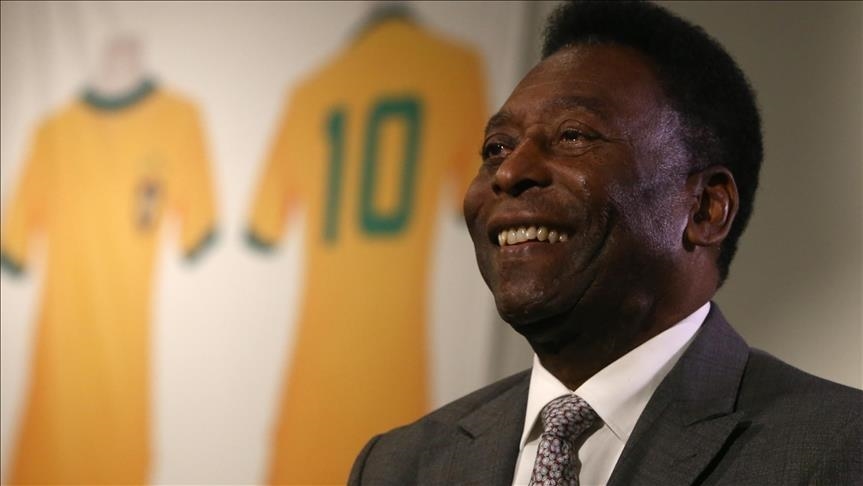More than player for his country, Pele leaves his mark on football in 20th century
Football legend netted over 1,200 goals, including unofficial matches, during his career in 1956-1977

ISTANBUL
After sealing an easy 4-1 win over South Korea in the 2022 World Cup Round of 16, Brazilian players brought out a banner in support of football legend Pele, who was hospitalized in Sao Paulo last week due to colon cancer.
Brazilian players had many reasons to pay tribute to Pele.
The Brazilian football icon is known as one of the greatest of all time with three World Cup trophies in 1958, 1962, and 1970 and was named Player of the Century by FIFA in 2000.
Pele netted over 1,200 goals, including unofficial matches, making him a legendary striker during his career from 1956 and 1977.
He was not only a top-class player but also an iconic figure on the pitch as his talents helped the recognition of his country in his performances at the World Cups and, became the first global football star.
Speaking to Anadolu Agency, Andrew Downie, a Scottish foreign correspondent based in Brazil and author of Doctor Socrates, believes that Pele left a remarkable legacy off the pitch, helping his country become known outside Brazil.
"The world did not know Brazil before Pele," he said.
"Most people could not find Brazil on a map in the 1950s. After Pele, especially after 1970, the whole world knows Brazil and identifies it as the true home of football. That's a phenomenal legacy."
Pele was a unique talent at that time and his playing style on the pitch made him unstoppable against defenders.
According to Downie, Pele could do everything and his influence was “enormous.”
"Head, shoot, pass, dribble, tackle, score with both feet, chest the ball, he was a leader, he had vision and power and speed and strength. No one else since has had the same range of talents. He was the greatest, everyone in Brazilian football looks up to him, and everyone recognizes that he was the best."
- Pele, inspiration to everyone in 1970 World Cup
Pele is the only player to win three World Cups and become the all-time leading goal scorer for the Selecao with 77 goals in 92 games.
He was only at the age of 17 when he won his maiden FIFA World Cup victory in 1958 in Sweden. With six goals in three matches, he led his nation to their first World Cup triumph and his performance drew global attention.
In 1966, he was injured in the second match and missed many parts of the tournament but in 1970, he appeared every minute, firing Brazil to their third title.
"Pele was the inspiration to everyone else on that team," said Downie.
Pele always has a spot in football’s GOAT (the greatest of all time) debate with three World Cups victories. He deserves the credit to be considered "the greatest of all time" since football was then in many ways more difficult, according to Downie.
"The pitches were not as flat, the strips were heavier, the boots not as soft, even the ball was heavier and not as round. You could tackle from behind and spit in people's faces. There weren't 24 cameras to record everything. And players back then did not have the advantages they have now," he added.
"Pele would travel by bus to games, and play twice a week for 10 months, he had no team of physios or doctors. At the very least, he is the greatest player of all time, alongside Messi, who you could argue is the greatest club player of all time."
- Pele criticized for not speaking against military rule
Pele, who had a sensational football career on the football field, was always criticized for not getting involved in political struggles and not speaking out against authoritarianism in Brazil.
His country was under military rule between 1964 and 1985, and for many people, Pele could do more, at least would raise his voice against the human rights abuses. But he did not prefer to use his influence over his citizens to fight for democracy, according to Downie.
Downie also said it is a valid criticism but added that many athletes also kept their silence against the military.
"The times were very different and people forget that very few sportsmen or women spoke out against Brazil's dictatorship, especially at the beginning. The real criticism should be that he did not change his views sooner when he realized what was going on. Many people did. Pele was late to do that."
In the footage of a Netflix documentary, “Pele,” he was seen hugging former President Emilio Garrastazu Medici, who ran Brazil from 1969-1974 under the oppressive regime.
The 82-year-old legend, one of the most influential people of the 20th century, is now at the hospital and said he watched his country's matches in the 2022 World Cup.
Anadolu Agency website contains only a portion of the news stories offered to subscribers in the AA News Broadcasting System (HAS), and in summarized form. Please contact us for subscription options.





